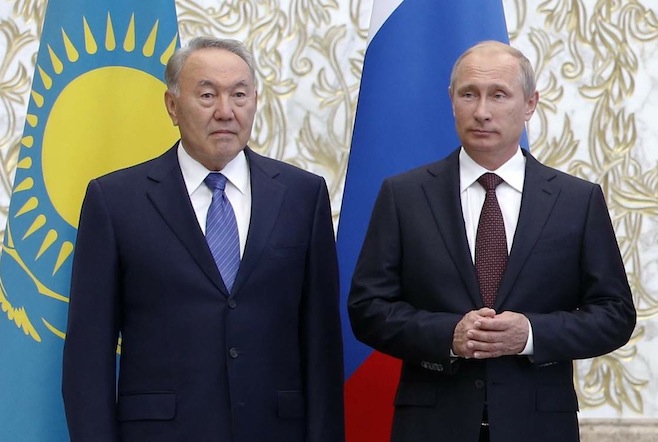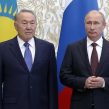
Kazakhstan Risks Becoming a ‘Second’ Ukraine in 2015, Russian Linguist Says
Publication: Eurasia Daily Monitor Volume: 11 Issue: 224
By:

Astana’s language and nationality policies have put Kazakhstan at risk of becoming a second Ukraine in 2015, according to Ilya Namovir, a Russian linguist who edits the “Russians in Kazakhstan” portal. The next twelve months are likely to be critical because, as a result of changes in laws and treaties, ethnic Russians in Kazakhstan will find it easier to move back to the Russian Federation and ethnic Kazakhs to move back to Kazakhstan. Moreover, the opening of a presidential election campaign in Kazakhstan will provoke the kinds of political declarations that will trigger concerns about the future among those ethnic Russians and Russian speakers who remain (Stoletie.ru, December 11).
In a commentary for Stoletie.ru, a Russian nationalist site based in Moscow, Namovir argues that “the Russian question” has never disappeared from political discussions in Kazakhstan but that in the wake of the situation in Ukraine, it has “again become more important.” This trend, he notes, shows no sign of changing given both the absence of any positive answer to it from Astana and the lack of either an organized Russian opposition or clear backing from Moscow. Either factor, according to the Russian linguist, might force Kazakhstani officials to change course.
Until about 30 years ago, ethnic Russians had a slight plurality over ethnic Kazakhs in the Kazakh Soviet Socialist Republic (SSR), and the Russian language completely dominated the republic. Now, although the Russian language remains predominant, Kazakhs outnumber ethnic Russians there by almost three to one, 63.1 percent to 23.7 percent. That shift, the result of a combination of Russian flight and both higher fertility rates among ethnic Kazakhs and the return to Kazakhstan of Kazakhs from abroad (who are known as “Oralmans”), shows no sign of changing anytime soon. Indeed, Namovir suggests, it may accelerate, leaving those who remain ever more despairing and potentially ever more radical.
Many commentators, he suggests, treat the departure of the ethnic Russians from the largest Central Asian country as an entirely natural phenomenon, one for which there is no need to discuss the causes or the consequences. But both are obvious. Ethnic Russians feel themselves increasingly uncomfortable in Kazakhstan because of the country’s linguistic and ethnic policies. And their departure, given that they are among the most educated and urbanized part of the population, threatens to undermine any chance that the republic will be able to grow in the future and cope with its own burgeoning population, Namovir contends.
A major reason ethnic Russians feel increasingly uncomfortable in Kazakhstan is the contradiction between the country’s constitutional mandate—that Kazakh is the state language while Russian is officially used—and the reality that they encounter every day. Because few Kazakhs speak their own language well and use Russian instead, many ethnic Russians and other non-Kazakh Russian speakers see the difference in law as a not-so-covert means of promoting the Kazakhization of Kazakhstan, a view that has politicized the language question.
That view, in turn, has been reinforced by what ethnic Russians see in Kazakhstan today: Officials promote Kazakhs instead of Russians to positions of power, even if the former know Russian better than the official language. Moreover, they form “clan”-like groups based on ethnicity rather than language in order to exclude Russians from power. And they dispatch ethnic Kazakhs to what have been predominantly ethnic-Russian regions in order to change the ethnic balance there, all without doing anything to promote the national language in ways that would allow even those Russians who are prepared to learn it to do so. All this leaves ethnic Russians with the sense that they are or will very soon become “second class” citizens. This same view prompted ethnic Russians in Crimea and Donbas (eastern Ukrainian region encompassing the Donetsk and Luhansk provinces) to rise up against Kyiv, Namovir claims, echoing the official Kremlin narrative.
This reality, he insists, is why Kazakh media outlets have been asking, since the beginning of the Ukrainian crisis, whether Kazakhstan will be next (see EDM, February 27, October 21). But they have failed to realize that the reasons for that are to be found not in Russian aggressiveness but in their own government’s actions, something they would clearly see if they would ask the alternative question: “Why not Belarus?” a country in many ways much more similar to Ukraine than Kazakhstan.
Such commentators, Namovir asserts, would then notice two aspects of Kazakhstan that make it a more likely candidate to be a future Ukraine: Astana has adopted laws that, as of January 1, will make it easier for ethnic Kazakhs now living abroad to return home and obtain citizenship, and at the same time Astana’s own agreements with Moscow will allow ethnic Russians a greater chance to return to Russia as well. As a result, the ethnic balance in Kazakhstan is going to swing further against Russians, and those who remain will feel that they are ever more likely to become victims of an ethnocratic state. Such changes will affect the presidential election campaign in Kazakhstan next year, exacerbating ethnic sensitivities still further, he argues.
Namovir, of course, has a vested interest in promoting the notion that the ethnic Russians in Kazakhstan are angry and growing angrier. He may be right, but as he acknowledges, the Kazakhstani Russians’ numbers are dwindling. That, in turn, has two consequences: It could prompt Moscow to intervene sooner if it wants to play this card, or it could lead the Kremlin to conclude that Kazakhstan is already lost as part of the Russian world.




